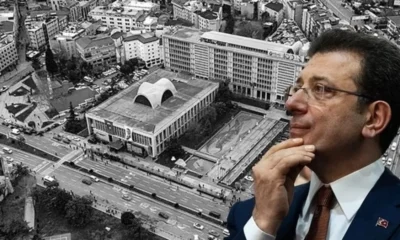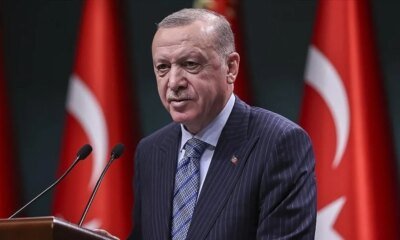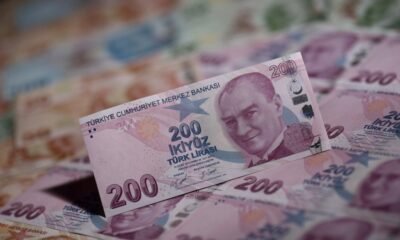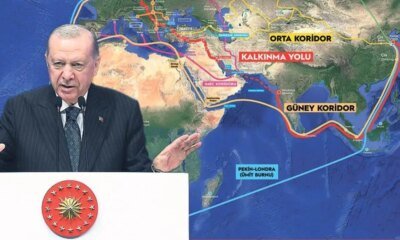Economy
China partially lifts ban on seafood imports from Japan
Chinese authorities have lifted a ban on seafood imports from most regions of Japan, partially mending a yearslong dispute over Tokyo’s handling of nuclear wastewater, mainly from the Fukushima plant.
China and Japan are key trading partners, but increased friction over territorial rivalries and military spending has frayed ties in recent years.
Japan’s brutal occupation of parts of China before and during World War II remains a sore point, with Beijing accusing Tokyo of failing to atone for its past.
Japan began gradually releasing treated wastewater from the stricken Fukushima nuclear plant into the Pacific Ocean in 2023.
The move was backed by the International Atomic Energy Agency (IAEA), and the plant operator TEPCO says all radioactive elements have been filtered out except for tritium, levels of which are within safe limits.
But it drew sharp criticism from Beijing, which banned imports of Japanese seafood as a result. Russia later followed suit.
Samples from long-term monitoring of nuclear-contaminated water from Fukushima had “not shown abnormalities,” China’s General Administration of Customs said in a statement Sunday.
As a result, China “decided to conditionally resume” seafood imports from Japan, with the exception of imports from 10 of the country’s 47 prefectures, including Fukushima and Tokyo, which remain banned.
The Japanese government received the decision “positively,” Kazuhiko Aoki, deputy chief cabinet secretary, told reporters in Tokyo.
But Japan “will strongly demand the Chinese side lift remaining import regulations on seafood from 10 prefectures,” he added.
Japanese Agriculture Minister Shinjiro Koizumi also called China’s move “a major milestone.”
In 2011, a huge earthquake triggered a deadly tsunami that swamped the Fukushima nuclear facility and pushed three of its six reactors into meltdown.
China vociferously opposed the release of the treated wastewater, casting it as environmentally irresponsible. But in September last year, it said it would “gradually resume” importing the seafood.
Production companies that had suspended trade must reapply for registration in China and would be “strictly” supervised, Beijing’s customs administration said Sunday.
Economy
Trump lifts US sanctions on Syria, keeps measures on Assad
President Donald Trump on Monday signed an executive order ending a U.S. sanctions program on Syria, paving the way for the country’s reintegration into the international financial system and reinforcing Washington’s commitment to support its post-war reconstruction.
The decision fulfills a pledge Trump made in May to unwind broad economic measures imposed during the Assad regime, aiming to support Syria’s “path to stability and peace,” White House Press Secretary Karoline Leavitt said during a press briefing.
“The order will remove sanctions on Syria while maintaining sanctions on the former President Assad, his associates, human rights abusers, drug traffickers, persons linked to chemical weapons activities, ISIS and their affiliates, and Iranian proxies,” she said.
“This is again an action that the president promised and shocked the world with in Saudi Arabia, because he’s committed to supporting a Syria that is stable, unified, and at peace with itself and its neighbors,” Leavitt added.
Some in Congress are pushing for the measures to be totally repealed, while Europe has announced the end of its economic sanctions regime.
“Syria needs to be given a chance, and that’s what’s happened,” U.S. Special Envoy for Syria Thomas Barrack told reporters in a briefing call. He described Monday’s move as “the culmination of a very tedious, detailed, excruciating process of, how do you unwrap these sanctions.”
The White House, in a fact sheet, said the order directs the Secretary of State to review the terrorism designations of Hayat Tahrir al-Sham, an anti-regime group that al-Sharaa led.
Trump first announced the policy shift at an investment forum in Riyadh last month, where he criticized the “brutal and crippling” sanctions. The next day, he met with Syrian President Ahmed al-Sharaa — the first meeting between U.S. and Syrian leaders in 25 years.
Al-Sharaa, who led anti-regime forces during Syria’s conflict, assumed the presidency in late January following the ouster of Bashar Assad. Assad fled to Russia on Dec. 8, 2024, bringing an end to the Baath Party’s decades-long rule, which began in 1963.
Economy
US, Canada to resume trade talks after Ottawa drops digital tax
The United States will immediately resume trade talks with Canada after Ottawa scrapped its digital services tax (DST) aimed at U.S. technology companies, White House economic adviser Kevin Hassett said Monday.
“Absolutely,” Hassett told Fox News when asked if talks would restart. “President Trump asked the Canadians to take the tax off at the G7 meeting in Canada. It’s something they’ve studied, now they’ve agreed to it, and for sure, that means we can get back to the negotiations.”
The announcement followed Canada’s Sunday evening decision to revoke the DST, which had been a major sticking point in bilateral discussions. U.S. President Donald Trump had announced on June 27 that trade negotiations with Canada were terminated “effective immediately” due to what he called an “egregious” tax on U.S. firms.
Canadian Prime Minister Mark Carney confirmed the policy reversal in a statement, saying the move would support “a resumption of negotiations toward the July 21, 2025, timeline set out at this month’s G7 Leaders’ Summit in Kananaskis.”
Carney added that Canada’s new government remains committed to securing a deal that advances the interests of Canadian workers and businesses. “In our negotiations on a new economic and security relationship between Canada and the United States, Canada’s new government will always be guided by the overall contribution of any possible agreement to the best interests of Canadian workers and businesses,” he said.
The developments mark a notable shift following weeks of escalating rhetoric and underline renewed efforts by both sides to restore economic cooperation amid broader talks on a redefined trade and security framework.
Economy
Trump to lift U.S. sanctions on Syria, keeps measures on Assad
President Donald Trump will sign an executive order Monday to terminate U.S. sanctions on Syria, White House Press Secretary Karoline Leavitt told reporters, marking a major shift in Washington’s approach following more than a decade of civil war in the country.
The decision fulfills a pledge Trump made in May to unwind broad economic measures imposed during the Assad regime, aiming to support Syria’s “path to stability and peace,” Leavitt said during a press briefing.
“The order will remove sanctions on Syria while maintaining sanctions on the former President Assad, his associates, human rights abusers, drug traffickers, persons linked to chemical weapons activities, ISIS and their affiliates, and Iranian proxies,” she said.
“This is again an action that the president promised and shocked the world with in Saudi Arabia, because he’s committed to supporting a Syria that is stable, unified, and at peace with itself and its neighbors,” Leavitt added.
Trump first announced the policy shift at an investment forum in Riyadh last month, where he criticized the “brutal and crippling” sanctions. The next day, he met with Syrian President Ahmed al-Sharaa — the first meeting between U.S. and Syrian leaders in 25 years.
Al-Sharaa, who led anti-regime forces during Syria’s conflict, assumed the presidency in late January following the ouster of Bashar Assad. Assad fled to Russia on Dec. 8, 2024, bringing an end to the Baath Party’s decades-long rule, which began in 1963.
Economy
Türkiye’s foreign trade gap at nearly $6.65B in May
Türkiye’s foreign trade deficit stood at nearly $6.65 billion in May, official data from the Turkish Statistical Institute (TurkStat) revealed on Monday.
The country’s exports totaled $24.82 billion in the month, up 2.6%, while imports amounted to $31.46 billion, up 2.7%, TurkStat said.
Excluding energy and non-monetary gold, the foreign trade deficit was $1.89 billion in the month.
In May, the ratios of the manufacturing industries products sector, agriculture, forestry and fishing sector, and the mining and quarrying sector in total exports were 95%, 3%, and 1.4%, respectively.
High-tech’s share in the manufacturing sector rose 7% to 4%, and medium-high tech’s share increased 10.8% to 38.9% year-over-year in May.
The top destination countries for Turkish exports were Germany, with $2.1 billion, followed by the U.K., with $1.52 billion, and the U.S., with $1.51 billion, the data showed.
China was the top source of imports to Türkiye with $4.31 billion, followed by Russia with $3.26 billion and Germany with $2.69 billion.
In January through May, the country’s exports totaled $110.9 billion, up 3.4%, and imports were at $152.16 billion, up 5.8%.
The foreign trade deficit for the five months was $41.25 billion, representing a 12.7% increase compared to January-May 2024.
Economy
Investors shift focus to Europe amid US trade war uncertainty
Peter Roessner is feeling both sides of U.S. President Donald Trump’s shaky trade war.
While tariff risks mean the CEO of Luxembourg-based hydrogen firm H2Apex can no longer rely on U.S. suppliers for its more than 200-million-euro ($235-million) project in Lubmin, Germany, investor interest in European projects is rising.
“Investors in the hydrogen sector are now focusing more on the European market due to the absolute uncertainty and planning insecurity in the USA,” he told Reuters, adding this included both local and U.S. players.
“The framework conditions in Europe are not ideal, but they are stable.”
Roessner’s comments are indicative of a trend that has taken hold in recent months: Investors and companies are increasingly turning to Europe, drawn by an infrastructure- and defense-led spending push that offers stability at a time when Trump’s erratic tariff policies have made the U.S. market a less safe bet, according to more than a dozen interviews with executives and fund managers.
The shift has also been fueled by Trump’s tendency to make sweeping tariff threats and announcements that are then often delayed or revised, and to issue executive orders that have tested the limits of his presidential power.
“The U.S. is coming from a very capital market-friendly and stable environment. Now there is political intervention and also an attempt to expand power,” said Christoph Witzke, who heads the CIO office at Deka, one of Germany’s largest investment funds.
“This creates uncertainty that some kind of intervention … could come at any time,” he said, adding that Europe had become the center of attention in the most recent investor conferences as a result. With a July 9 deadline for a trade deal less than two weeks away – and Trump saying he will impose 50% tariffs on all EU goods without a deal – investors have started shifting their money.
Data from LSEG’s Lipper Funds show that more than $100 billion has flowed into European equity funds so far this year – up threefold from the same period last year – while outflows from the U.S. more than doubled to nearly $87 billion.
“All that is an indication that at least market forces, investors, those who move real money around, actually see value and have confidence in Europe,” ECB President Christine Lagarde said earlier this month. This shift in focus was also illustrated by the weak market debut of Holcim’s North American spin-off, Amrize, in late June. Amrize was announced to much fanfare in early 2024, at a time when the lure of U.S. valuations also excited some of its rivals.
In contrast, the share price of Holcim itself, now squarely focused on Europe, Latin America and North Africa, soared 15%.
Sentiment can quickly turn
Siemens Energy, which makes more than a fifth of its sales in the U.S., has noted a shift in sentiment, finance chief Maria Ferraro said, on the back of a recent U.S. road show and an 84% rise in the group’s share price year-to-date.
Apart from the improved market outlook, additional investments are also crucial in efforts to revive the EU’s economy and narrow its competitiveness gap compared to other regions, most notably China and the United States.
Closely watched foreign direct investment flows into Germany, the bloc’s largest economy, more than doubled to 46 billion euros in the first four months of 2025, according to the most recent data from the Bundesbank, marking the highest level since 2022.
It also shows that German companies even withdrew money from the U.S. in three of the first four months of the year, with their balance of foreign direct investments in April at a negative 2.38 billion euros.
Negative balances emerge when companies either divest more than they invest in a foreign country or decide against extending credit lines to local counterparts.
But the picture is not all rosy, with several investors pointing out that Europe is now under pressure to act faster, create better regulation and make good on its spending pledges.
“This sentiment can quickly turn again. This should be both a warning and an incentive to use the momentum now and consistently implement the planned agenda,” said Stefan Wintels, head of German state-backed lender KfW.
This chimes with comments from Hajo Kroesche, a partner at private equity firm Altor, who said, “The window of opportunity will not stay open forever” for Europe to attract capital.
Having recently traveled to Qatar, Abu Dhabi and Saudi Arabia, Deutsche Bank CEO Christian Sewing last week said investor interest in Europe and Germany was huge, while still cautioning that conditions needed to be stable in the long term.
“These are not people who invest within two days. But of course, they see what is happening in the world right now.”
Economy
Despite shocks, Turkish economic program not shaken: Erdoğan
The structural resilience of the Turkish economy has been strengthened with the program the government is implementing, President Recep Tayyip Erdoğan said on Monday.
He also said that the program “has not been shaken” despite the shocks, while praising the continued growth of the economy at the event in Istanbul.
“Thanks to the program, we have strengthened the structural resilience of our economy. Despite all kinds of shocks experienced, especially in the past three months, the program has not been shaken,” Erdoğan said.
Delivering a speech at the 32nd Ordinary General Assembly of the Turkish Exporters Assembly (TIM) and Export Champions Award Ceremony, the president also said they expected to see inflation figures in the 20s by the end of the year.
Annual inflation in Türkiye eased to 35.4% in May, touching the lowest level since late 2021 amid a continued disinflation period in the face of tight monetary conditions.
“Our reserves are starting to increase again. Confidence in the Turkish lira is increasing. Inflation has been declining uninterruptedly for a year,” he said.
“Inflation in May is at its lowest level in the last three and a half years. We aim to see figures in the 20s by the end of the year,” he added.
Turkish central bank targets inflation to drop to 24% by the end of 2025 with a wider window range between 19% and 29%. The officials have also repeatedly conveyed the aim to see the consumer price index (CPI) in the 20s range.
The data for June, which is due to be announced later this week, is likely to show the rate easing further, according to the latest polls.
Moreover, touching upon exports, Erdoğan said that 2024 was “a record year in terms of exports.”
“We broke a record with $262 billion in exports. The number of companies exporting over $1 billion last year increased to 18. We continue on our path with the same rhythm in 2025,” he continued.
“Our exports increased by 2.7% in May. In the January-May period, goods exports increased by 3.5%. We are also doing quite well in terms of service exports,” he added.
Defense, drone exports
At the same time, he drew attention to medium-high and high-tech product exports as well as the success in the shipments from the defense and aerospace sector.
“The increase in Türkiye’s exports has changed not only in quantity but also in quality. In 2024, medium-high and high-tech product exports exceeded $101 billion. We continue to work to expand our exports,” said Erdoğan.
“In 2024, we provided TL 24.7 billion worth of resources to our companies to support exports of goods and services. Factors such as increasing geopolitical tensions have reminded us once again that we need to boost the geographical diversity of our exports. We aim to lift our exports to distant countries to $50 billion and the share of the Organisation of the Islamic Cooperation (OIC) countries in our total exports to 30% by 2028,” he noted.
“We have managed to become one of the leading countries in armed and unarmed unmanned aerial vehicles (UAVs). Turkish companies produce two out of every three UAVs sold in the world. We have become a global brand in armored land vehicles. God willing, we will achieve the success we have in UAVs in warplanes,” he added.
He also recalled that defense exports reached the volume of $7.1 billion, referring to last year’s figures, which marked a new record for the sector.
As part of his remarks, he also mentioned that the Turkish economy expanded by 3.2% in 2024, also adding that it grew by 2% in the first quarter. “We have achieved uninterrupted growth for 19 quarters,” he said.
Speaking at the same event, Trade Minister Ömer Bolat stated that exports continued to increase despite major challenges.
“In five out of the first six months of the year, we have achieved more goods exports than in the same months of the previous year. We continued to increase in service exports as of the first four months,” he said.
Starting his speech, Bolat recalled that the 2000s, which started with great excitement and hope, were subject to major conflicts and crises such as the world financial crisis, global pandemic, wars and energy wars. He, however, expressed that Türkiye maintained its political stability under the leadership of President Erdoğan despite being in the middle of these crises and the ring of fire, also suggesting that major developments were made in industry, agriculture, services and trade with the reforms in the economy, successes in foreign policy and major projects implemented.
He said that Türkiye’s national income has increased sixfold in dollar terms in the last 22 years, reaching $1.37 trillion and that the national income per capita has increased fourfold, approaching $16,000. Thus, he said Türkiye has risen to the league of high-income countries according to the World Bank.
The minister also said that the annualized exports have reached $265.5 billion as of the end of May.
“Last year, we generated a total of $377 billion in foreign currency. Our president has set a target of at least $390 billion for this year, and with God’s permission, we will complete this by the end of the year,” he maintained.
Top exporters
At the event, the companies that made the highest contribution to Türkiye’s total exports of $377 billion in goods and services last year received their awards.
In services exports, the crown belonged to the flag carrier Turkish Airlines (THY), which was followed by other companies mostly operating in the aviation industry, including Pegasus, Güneş Ekspres Aviation Inc., IGA Airport Operation Inc., and TAV Airports Holding Inc.
The top 10 companies that exported the most goods in 2024 were listed as Ford Automotive, Toyota Automotive Industry Türkiye Inc., Türkiye Petroleum Refineries Inc. (Tüpraş), Kibar Foreign Trade Inc., Star Refinery, TGS Foreign Trade Inc., Oyak-Renault Automobile Factories, Vestel, Arçelik and Baykar Makina.
Moreover, in the e-export category, Trendyol Group ranked first, and was followed by Asır Group Export Inc. and Modanisa Electronic Retailing and Trading Inc.
The event in Istanbul was also attended by Industry and Technology Minister Mehmet Fatih Kacır, Youth and Sports Minister Osman Aşkın Bak and TIM head Müstafa Gültepe.
-

 Daily Agenda3 days ago
Daily Agenda3 days ago32 arrests in doner operation connected to FETÖ
-

 Daily Agenda3 days ago
Daily Agenda3 days agoCrypos were deciphering – Breaking News
-

 Daily Agenda3 days ago
Daily Agenda3 days agoMinister Ali Yerlikaya explained! Operation for Cyber Crimes in 48 provinces: 284 suspects were caught in 1 week
-

 Daily Agenda3 days ago
Daily Agenda3 days ago36 confessors in corruption investigation! Imamoglu’s key men told one by one: the bench broke down like this
-

 Daily Agenda2 days ago
Daily Agenda2 days agoPresident Erdoğan listed the gospels one after the other! “Credit opportunities up to 10 million with 10 years of maturity”
-

 Economy1 day ago
Economy1 day agoTürkiye advances toward exit from FX-protected scheme
-

 Sports1 day ago
Sports1 day agoChelsea set up Palmeiras clash after Club World Cup weather delay
-

 Daily Agenda3 days ago
Daily Agenda3 days agoTürkiye is the world of trust in the world – last minute news




